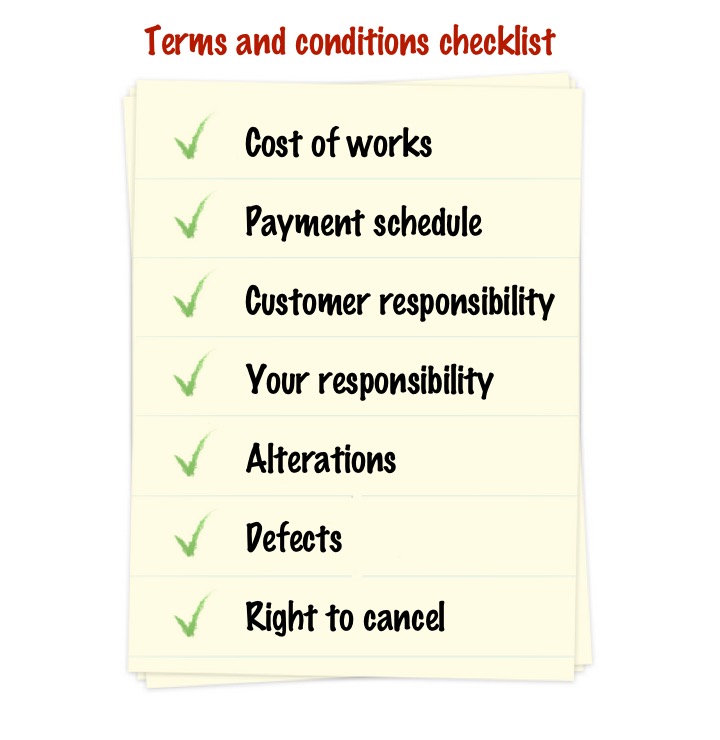Terms and conditions. The fine print. For most people, they’re skipped over and ignored… so, why should your business have them and what should your terms include?

Essentially, terms and conditions are rules a customer must agree to abide by in order to use a service. They set out what is expected of both the customer buying the service and of the service business providing the service.
Generally provided at the time a quote is submitted – or just before work starts on a new job – terms are in important part of completing work for your customers, but why should your business be using them and what should they include?
Why are clear terms important?
Terms set out the conditions and expectations of the service business and of the customer, and so are an important piece of communication for completing work.
Emma jones from Enterprise Nation agrees on the importance of businesses providing terms:
“Terms and conditions certainly have an important role to play when it comes to customers and suppliers understanding their duties, rights, roles and responsibilities.”
By setting out clear expectations for the work you’re about to complete, both your business and your customers can benefit in the following ways:
Peace of mind. Dotting i’s and crossing t’s give both you and your customer peace of mind that everything is ‘on the table’ and clear. Peace of mind comes from knowing that everything has been agreed before any work starts.
Trust and credibility. Setting out terms before work starts builds your customers trust and improves your credibility – with important work criteria clear and upfront, your customer knows exactly what they’re getting into, and what they can expect from you.
Avoid disputes. Despite your best efforts, disputes can arise during the course of completing work. These disputes are often caused by uncertainty about what’s expected. Terms will help both you and your customer understand expectations, and so will often mean disputes are avoided before they arise. When disputes do occur, clear terms can quickly settle the dispute if they’ve addressed what happens in the case of a dispute.
Professional image. As well as the practical benefits for setting out your terms, your business can benefit from the professional image you portray by supplying terms. It can act as strong evidence that you know your business, and are clear about what it means to work with your business.
Having clear terms agreed with your customer for all service work you’re completing helps avoid headaches once work starts.
When to include terms and conditions?
Providing your customers with terms and conditions that are 6 pages long, full of legal speak and tiny fonts can undermine the confidence your customers might have in your business. Try and keep your terms short, concise and easy to understand to get the most from them.
So, should terms be included with every piece of work?
Regardless of the size of the work you’re completing for your customers, the benefits from providing terms and conditions remain the same. In fact, advice from the Homeowners Alliance to homeowners suggests always seeking written terms before agreeing to work:
Undertaking building work in the absence of [terms] leaves homeowners and builders at risk because there isn’t a formal agreement around what is in and out of scope, how payments will be made, completion dates, whether the correct insurance has been taken out and so on.
Making sure your customers understand what’s included in your terms helps build trust and confidence – offer your customers the chance to ask questions or ask for clarification on anything they don’t understand.
Even if your terms are lengthy, providing a summary of the key points from your terms – such as expected payment schedule, the customers right to cancel, and how long the quote is valid for can be enough when you’re quoting for work.
Include terms for every job you complete – either as part of your quotation or as a document in their own right.
What to include – a checklist for your Ts & Cs
We know terms are important, can protect your service business – and your customer – but what should you include in your terms?
Here are our suggestions on what you should consider including in your terms:

 The cost of works. As obvious as it sounds, ensuring the complete cost of works is agreed between both parties is essential. Your terms could reference your written quotation, and confirm the total amount quoted is the complete cost of the work. If you’re estimating the cost of work, ensure you identify how you will agree additional costs with your customers before they incur them.
The cost of works. As obvious as it sounds, ensuring the complete cost of works is agreed between both parties is essential. Your terms could reference your written quotation, and confirm the total amount quoted is the complete cost of the work. If you’re estimating the cost of work, ensure you identify how you will agree additional costs with your customers before they incur them.
 The payment schedule. Agree when payment – or part-payments – become due. Will you be meeting the cost for all materials up front? Do you require a deposit payment? When and how should any outstanding amount be paid? By agreeing payment terms and a schedule for payments before work starts, you help avoid disputes and unexpected invoices during work.
The payment schedule. Agree when payment – or part-payments – become due. Will you be meeting the cost for all materials up front? Do you require a deposit payment? When and how should any outstanding amount be paid? By agreeing payment terms and a schedule for payments before work starts, you help avoid disputes and unexpected invoices during work.
 Your customer’s responsibilities. Do you require access to the property between particular hours of the day? Do you require facilities – water, electricity, toilets, etc – to be available to you at all times you’re in the property? Are your tools to be stored securely on the property? If heavy objects need to be moved prior to the job, will this be your responsibility or your customers? Being clear on the responsibilities your customers have can reduce the likelihood of nasty surprises later on.
Your customer’s responsibilities. Do you require access to the property between particular hours of the day? Do you require facilities – water, electricity, toilets, etc – to be available to you at all times you’re in the property? Are your tools to be stored securely on the property? If heavy objects need to be moved prior to the job, will this be your responsibility or your customers? Being clear on the responsibilities your customers have can reduce the likelihood of nasty surprises later on.
 Your responsibilities. Of course this is a two-way street; you have responsibilities to your customer, too. Are you responsible for clearing up at the end of the job, or at the end of each working day? What happens if you aren’t able to provide work on an agreed date? Will you be using sub-contractors during the job? Agreeing on your responsibilities will help both your service business and the customer know exactly what is expected before work starts.
Your responsibilities. Of course this is a two-way street; you have responsibilities to your customer, too. Are you responsible for clearing up at the end of the job, or at the end of each working day? What happens if you aren’t able to provide work on an agreed date? Will you be using sub-contractors during the job? Agreeing on your responsibilities will help both your service business and the customer know exactly what is expected before work starts.
 Alterations. If a situation arises that changes the original terms or description of works, make sure to confirm this in writing and get signatures if you can. By keeping a copy of the agreed amendments along with the original contract, you can refer back to this should any dispute arise. Stipulating this condition within your terms keeps things clear and sets out a process for both parties agreeing to changes to the scope of work.
Alterations. If a situation arises that changes the original terms or description of works, make sure to confirm this in writing and get signatures if you can. By keeping a copy of the agreed amendments along with the original contract, you can refer back to this should any dispute arise. Stipulating this condition within your terms keeps things clear and sets out a process for both parties agreeing to changes to the scope of work.
 Defects. If you offer guarantees on your work and/or materials, be sure to include this within your terms. If you don’t, you should consider stipulating which defects you would return to fix – and whether there’s a cost for those remedial works. You should also agree on an appropriate length of time for this offer to stand.
Defects. If you offer guarantees on your work and/or materials, be sure to include this within your terms. If you don’t, you should consider stipulating which defects you would return to fix – and whether there’s a cost for those remedial works. You should also agree on an appropriate length of time for this offer to stand.
 Right to cancel. What are the timings of the agreement and what notice is required to get out of it? Specifying what happens if either party doesn’t deliver or pay or wants to end the relationship – and what costs the customer would still be liable for – can help avoid disputes and give a clear process for handling work cancellation.
Right to cancel. What are the timings of the agreement and what notice is required to get out of it? Specifying what happens if either party doesn’t deliver or pay or wants to end the relationship – and what costs the customer would still be liable for – can help avoid disputes and give a clear process for handling work cancellation.
 Late payment penalties. If you do not specify a late payment so in your terms, you have no right to charge interest for late payment, so you could be out of pocket if a customer pays late.
Late payment penalties. If you do not specify a late payment so in your terms, you have no right to charge interest for late payment, so you could be out of pocket if a customer pays late.
How to get your own terms and conditions
There are several ways you could get terms drafted for your service business:
Trade associations and organisations. Do you belong to a trade organisation? Check with them if they provide professional, legal template terms that you can use. Trade associations often provide free templates for their members, and these have usually been drafted in conjunction with suitable legal advice.
Hire a solicitor. If the terms of service for your business are unique, you might find a template doesn’t quite cover what you want to include. Hiring a qualified solicitor to complete your terms might be the best option. Start by pulling the terms from a template that are suitable, and then add your own conditions – it’ll be cheaper for them to re-draft something you give them than for them to produce terms from scratch. Whilst an expensive option, having a legal professional draft your terms could save you a huge amount of money should a dispute arise.
Online term templates. Free or cheap templates for terms and conditions are readily available online. Should you decide to use template terms, ensure they include all the details you want to convey to your customer. In order to be confident they protect your business (and your customer) adequately, it’s recommended you ask a legal professional to check over the terms and make sure they are legally sound.
If you’re unsure on the validity of your business terms, always seek advice from a legal consultant who can make sure your business is properly protected.
What now?…
If you’ve got terms for your business, take a few minutes and re-read them to make sure what you’re asking your customer to agree to is still up-to-date and relevant for your business today.
If you have terms and don’t supply every customer with a copy, make sure to include terms with every quote or at the start of every job. If your service business uses YourTradebase then you can add your terms to your quote or job confirmation templates easily – this ensures they’re always sent to your customers when you quote or start a new job. (More info on email templates in YourTradebase can be found here.)
If you don’t have any terms for your business, then you’re probably not protecting yourself or your customer. You’re probably also losing some customer trust – so make providing your terms and conditions an everyday part of working with your service business.

